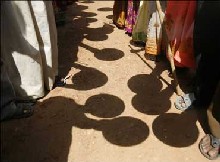The Planning Commission's de-linking entitlement benefits for the poor from the Suresh Tendulkar committee's recommendation on determination of poverty has left a big question mark on the number of beneficiaries to be covered under the proposed Food Security Act. Its draft, as formulated by the food ministry, proposes to grant legal entitlement for subsidised grains to three-fourth of the rural households in the country and half of urban household.
Its draft, as formulated by the food ministry, proposes to grant legal entitlement for subsidised grains to three-fourth of the rural households in the country and half of urban household.
Of this, 46 per cent of rural households will belong to the priority sector category, which can also loosely defined as akin to the current BPL (below the poverty line).
The urban areas will have at least 28 per cent of the population belonging to this category.
Now, these numbers - mainly those dealing with the priority sector households - are under the scanner as they have been derived using the Tendulkar panel's recommendations.
So, one will see an entirely new set of numbers emerge if the government decides to delink entitlements under the proposed Food Security Act in tune with the Tendulkar committee's formula and base it on the socio-economic caste census currently underway in many parts of the country.
According to Rural Development Minister Jairam Ramesh, the Bill is a work in progress and has to be discussed with states, seeking their full comments.
The final Bill that the Cabinet approves will decide the numbers under priority and general category households, he told reporters.
The plan panel also said that now onwards identification of beneficiaries under a scheme won't be dependent on the poverty estimation, but instead on the socio-economic caste census or BPL census.
This should raise a big question mark on the numbers as estimated by the food ministry and also the subsequent requirement of grains to successfully run the programme.
The ministry feels as and when the Act is implemented in full, the requirement of grains for feeding the poor as suggested by the draft Bill should be somewhere around 61 million tonnes as against 55-60 million tonnes current annual average procurement of grains for the central.
The extent of subsidy is also expected to alter if the beneficiaries under the proposed Food Security Act are determined on the basis of socio-economic caste census.
Already, unofficial estimates said that country's food bill could rise to somewhere around Rs 95,000-99,000 crore (Rs 950-990 billion) if the proposals made in the draft bill is implemented in toto.
In the 2011-12, budget, the government had estimated the food subsidy Bill to be around Rs 60,573 crore (Rs 605.73 billion).
The draft food security bill proposes to give 7 kg of grains per person a month to priority sector households, while the general-category households will get 3-4 kg of grains per person per month.
Rice will be given to priority sector households at Rs 3 per kg, while wheat at Rs 2 per kg and coarse cereals at Rs 1 per kg. Grains will be supplied to general category households at a price which will be related to the minimum support price.











